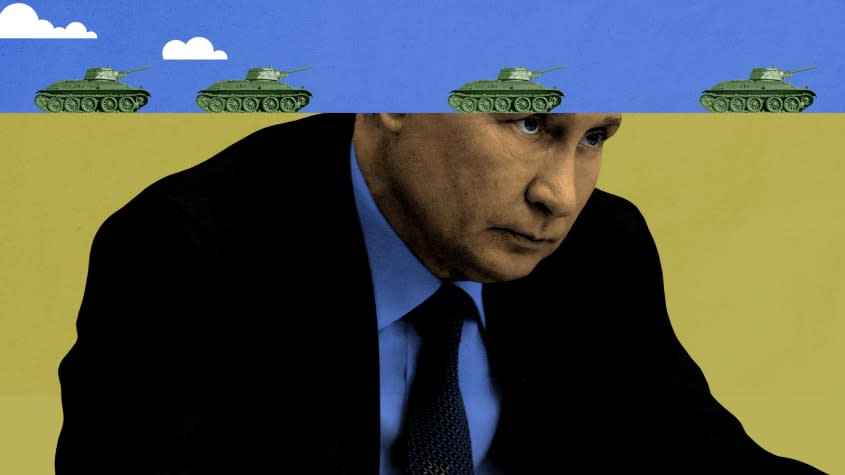The debate over Putin's 'off-ramps,' explained

- Oops!Something went wrong.Please try again later.
Almost since the beginning of Russia's war against Ukraine, observers have discussed the need to give Russian President Vladimir Putin an "off-ramp" out of the situation he has created — incentives that give him a face-saving way to wind down the invasion so that Ukraine can return to peace, Russia can return to something like pre-war economic normalcy, and the world can avoid the conflict blowing up into something even worse.
"The question for western leaders is how to ensure Putin is defeated while nevertheless providing him with a route out of the crisis and avoiding any missteps that could lead to a wider conflagration," The Atlantic's Tom McTague wrote in March. It's a question that remains relevant even as Russia and Ukraine settle in for what appears to be a much longer war than anybody expected at the outset — but there are critics of giving Putin an out. Can off-ramps help end the war, or do they offer a compromised promise of peace? Here's everything you need to know:
Why can't Putin just end the war and bring his troops home?
That would seem to be the easiest way out, right? After all, notes the BBC's John Simpson, Russia in Ukraine has reportedly "sacrificed more men and material than it lost in its two shockingly violent wars in Chechnya." But for Putin, "the search is on for ways of saving face" because the authoritarian leader can't be seen as having lost the war. "For President Putin, all that counts now is that he can declare victory" even if the world — and Putin's own people — "will understand that Russia has been given a bloody nose in this unnecessary invasion."
This isn't about letting Putin lose with grace, former Israeli diplomat Shlomo Ben-Ami writes for Project Syndicate. If Putin really thinks that he's lost the war, "he may well view deployment of tactical nuclear weapons as the minimum requirement to save face." The scary scenario: "Autocrats who lose wars lose power – and, sometimes, their heads." And a situation where Russia is defeated and Putin is run out of office isn't necessarily better for Ukraine or the world, because it could turn Russia into a "rogue nuclear superpower ruled by military coup-makers with revanchist impulses. Germany after World War I comes to mind."
What would a concrete peace proposal actually look like?
The outlines of a peace deal are already on the table, says Samuel Charap at Foreign Affairs. Both sides would have to give something and lose something. "Ukraine would get an end to the current Russian assault and strong guarantees against potential future aggression" as well as "Moscow's promise to stand aside on its path to EU membership," while Russia "would get Ukrainian neutrality, ending the prospect of its NATO membership" but would have to accept "Ukraine's final departure from the Russian sphere of influence."
It's not that simple, Katherine Lawlor and Mason Clark write for the Institute for the Study of War. "Annexation of Ukrainian lands is likely the only 'off-ramp' that Putin is interested in pursuing at this time," and would probably include permanent Russian control of Ukraine's Luhansk and Donetsk territories. "Even this face-saving option, which falls far short of the Kremlin's initial war aims of complete regime change in Kyiv, would be a devastating blow to Ukraine."
What else are critics saying?
Off-ramp proponents have several mistaken assumptions, writes The Atlantic's Anne Applebaum. "The first assumption is that Russia's president wants to end the war" and "that he is actually searching for a way to save face." In reality, Putin's "goals remain audacious." The second mistaken assumption is that Russia would actually stick to any peace agreement it signs. That's probably not true. "No future promises made by the Russian state, so long as it is controlled by Putin, can be believed." Her conclusion: "The West should not aim to offer Putin an off-ramp; our goal, our endgame, should be defeat."
The off-ramp discussion presumes that Putin needs to save face, Yale University's Timothy Snyder writes on his Substack blog. His control of Russia's media eliminates any requirement to produce a real-world victory. "Putin's power is coterminous with his ability to change the subject on Russian television" so "if defeated in reality, Putin will declare victory on television, and Russians will believe him, or pretend that they believe him."
Is there any chance that Putin would actually take an off-ramp?
"Putin will end the war only when he decides he has no other choice," David Von Drehle declares at the Washington Post. Perhaps more importantly, any off-ramps offered to Russia have to be acceptable to Ukraine's leadership. "The whole world was surprised by the fierce patriotism of [Volodymyr] Zelensky and his people when the invasion began, "and "that patriotism won't evaporate just because Washington or Berlin or Brussels commands it."
But "the longer this war goes on, the more opportunity for catastrophic miscalculations," says The New York Times' Thomas Friedman. There's a risk that America will be dragged directly into war with Russia. That means "we could be creating an opening for Putin to respond in ways that could dangerously widen this conflict — and drag the U.S. in deeper than it wants to be." The off-ramp isn't just for Russia, then. It's for the entire world.
You may also like
Goats are giving firefighters in Northern California an assist
Ex-Trump adviser Peter Navarro indicted for contempt of Congress over Jan. 6 probe
Harvey Weinstein fails to get his sexual assault conviction overturned

